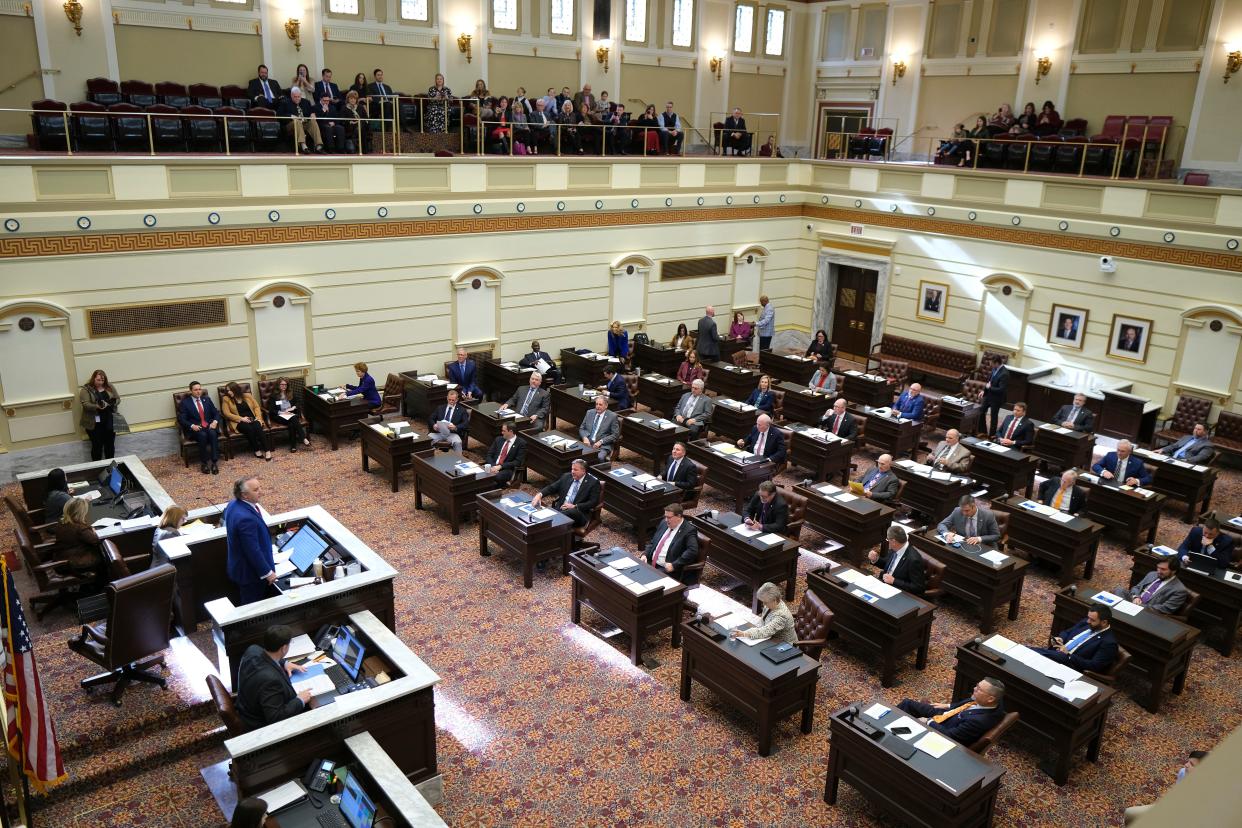State Legislature reaches midpoint with hope alive for school support, tax relief

- Oops!Something went wrong.Please try again later.
The Oklahoma Legislature has reached the midpoint of its 2023 session with many of the Republican-led government's priorities staying alive as a major deadline passed.
As the milestone was passed, Gov. Kevin Stitt commented on Friday that the "big picture" items on his legislative agenda could still become law, like grocery and income tax cuts, school choice and funding, and workforce development.
"Those three things are my priorities, and they're all still alive and I'm confident that we're gonna get that across the finish line," Stitt said.
But nearly 200 bills that were alive at the beginning of the week failed to win the approval of their chamber of origin, either the House or Senate. Those that were not voted upon became what the Legislature calls "dormant" and cannot become law this year. Some could possibly be revived in the 2024 session. Bills that were heard on the floor of the House or Senate, but didn't get enough votes to pass are considered dead.
As usual, there's an exception to every rule. Bills can be reconsidered in a rare and special procedure that requires support of both House and Senate leadership.
Legislation left behind
Here's a list of just some of the legislation that either went dormant or died this past week:
The proposals cover a wide swath of state law, with some more notable than others. The now-dormant legislation includes Senate Bill 834, which would have created exceptions for legal abortions, and Senate Bill 1103, which would have let utility companies move to a performance-based rate plan. State regulators and others were concerned that the change would lead to higher rates for customers of the state's largest electric utilities.
The abortion bill was seen as a response to the U.S. Supreme Court's ruling that overturned Roe v. Wade. It would have granted some exceptions in state law that would allow for legal abortions. Both anti-abortion and pro-choice sides of the abortion issue have warned that legislative inaction could lead to political support for an initiative petition to enshrine abortion rights in state law.
The House declined to advance legislation in House Bill 2114 that would have let some non-U.S. citizens receive state-issued identification cards and driver's licenses. An attempt with House Bill 2569 to curtail the Oklahoma State Board of Education's authority to set accreditation rules also fell dormant.
House Bill 2114 was bipartisan legislation that would have let certain non-citizens get a driver's license or state-issued ID. Its companion legislation, Senate Bill 669, also failed to receive a hearing.
Senate Bill 1088 would have required law enforcement agencies to submit a report to the governor and the Legislature on the private property seized each year. The use of civil asset forfeiture has been criticized across the country for being applied unfairly, especially against people who haven't been charged with a crime.
House Bill 2569 would have imposed a moratorium on the state Education Board's ability to approve and impose new school accreditation rules without specific legislative authorization. On the same day this legislation became dormant, the board voted to approve a new requirement that schools notify a student's parents if the child changes gender identity or pronouns. Failure to comply with the rule would result in an accreditation demotion.
House Bill 1823 would have reset school board election dates to more closely align with traditional election cycles, and would have required board members to attend 12 hours of training before seeking another term.
House Bill 1904 would have allowed the prices of goods and services to increase greater than 10% during a state of emergency if the increase was attributable to price increases in natural gas or other commodity markets.
Attempts to expand Oklahoma's alcohol industry failed to advance. House Bill 2090 would have allowed for the creation of alcohol delivery businesses, and House Bill 2354 would have permitted liquor sales in grocery stores.
House Bill 2060 sought to require landscapers to be licensed by the state. It failed, 21-72.
House Bill 2146 would have let nonresidents obtain a two-year medical marijuana patient license. The current option for nonresidents is a temporary, 30-day license. The House of Representatives voted on the bill but rejected it 30-59.
Two bills that were criticized by the LGBTQ+ community as criminalizing drag shows failed to get a hearing in their chamber of origin. House Bill 2186 and Senate Bill 503 will not advance this year.
This article originally appeared on Oklahoman: Tax relief, school support still alive at Legislature's midpoint

